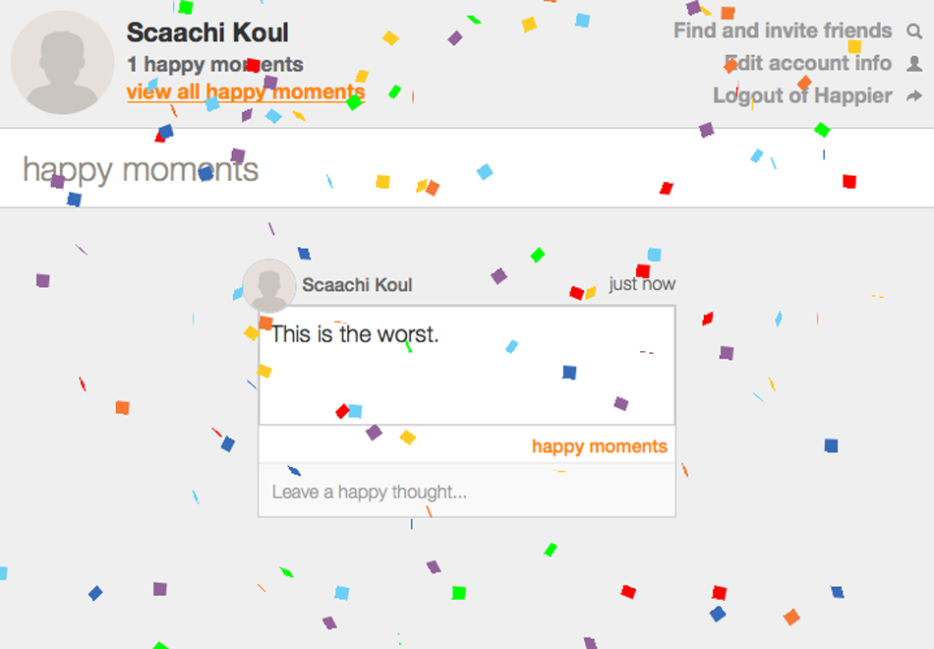Social media—and, really, the Internet in general—is filled with enough pessimism and cynicism and white-hot rage to last us a few lifetimes, and this, apparently, wears on some people. So, in comes Happier, a Brooklyn-based start-up that’s out to try to change that. It’s a no-negativity-allowed social network where people can post about the little things that make them happy: waking up before your alarm goes off and feeling rested, playing mini golf, red Converse sneakers.
If that all sounds like a total fucking bummer, that’s because it is.
It’s something your mom would sign up for, spam you about relentlessly until you join, and then, when you give in and look at her profile, it’s just post after post about making jam and watching the rain and honeysuckle and little girls in French braids.
Happier is just the latest addition to the appreciate-the-little-things culture, where we’re all reading books about how “awesome” everything is, pinning on Pinterest the things that make us happy, and gazing upon the reservoir of photos of sun-drenched skylines that is Instagram. All of this in the name of encouraging modern people to slow down and smell the roses, as they say.
But for many of us, the constant push to be happy all the time has the opposite effect. Sites like Happier are mostly harmless in their aim—to provide a safe space to titter away about fresh-cut grass and napping kittens—but they play into the greater idea that being happy all the time is normal, even expected. Attaining happiness isn’t as easy as a lot of people like to think, and it makes the whole ordeal seem even more unattainable. I like coffee just as much as the next guy, but I never experience some kind of metaphysical bliss when I have one, so much so that I literally need to tell the entire world. It’s upsetting, watching other people force affected happiness into their lives.
And our capacity to brag about how totally together and great our lives are or seem to be has never been greater. We’ve built a suffocatingly dumb hashtag around it. Happiness is the pinnacle, that toward which we must strive. We’re always trying to be happy, find happy, build happy, make happy. Yet watching this process is one of those things that makes us lonelier, even as spectators: Everyone is having fun without me, finding ways to carve out pockets of joy, and here I am, furious at this can of kidney beans that won’t. fucking. open.
Internet happiness is pure artifice.
Facebook and Twitter already foster plenty of communities full of people cheering on life. There are the people who tweet “Good morning!” every godforsaken day, friends you consider dropping from your life because they will not stop taking pictures of every sunset they see, old work acquaintances you now loathe because they have been talking about Kombucha for three weeks straight. It seems for many, happiness only comes in one form: ebullient glee. But the feeling is in the eye of the beholder, and what might register as happiness for you could very well be hanging on the walls of my own personal hell. Happiness to me is often finding a friend who hates all the things I hate.
Why can’t anyone just be happy with being unhappy?
The world can be terrible. The Internet is a murky ecosystem that plays host to some of the worst elements of humanity, and that’s just the comments section on any news article. Revel in your bleakness. Find a balance between counting your blessings and relishing the fact that you have the opportunity to experience unique and varied levels of discomfort. You know what really brings people together? Misery. Bonding over the universality of unhappiness.
And, look, even I am not immune to a BuzzFeed list of cute cat videos. I’ve had to put a filter on my work computer for videos of dogs greeting their owners when they return from combat because I sob every time and it becomes a human resources issue. But we’re at the point where temporary contentment is an industry unto itself, where we’re encouraged to dull our senses with gifs of babies eating fruit for the first time whenever we feel a pang of hurt or discomfort. Finding joy in every little thing isn’t natural. It’s not normal to keep obsessive lists of all the things that make us even mildly content. Surely we aren’t so far gone that simply experiencing something good isn’t enough, that we have to record it in every possible way, on every available platform, and share it so that other people also know that, look, I felt a good feeling. Appreciate a bad day. Let it rattle your bones. Take something from it. Don’t just push it aside because you feel you need to try to achieve happiness. This isn’t a video game level.
A lot of us are at least a little unhappy. The push to find more and more things to correct that, to eliminate all unhappiness, is a direct reaction to the fact that we feel glum, and small, and sensitive, and irritable. We’re trying to connect. Happiness is elusive, and not many people can say they truly possess it. But are we not wasting our lives digging for it in everything we do? Why spend so much time assiduously documenting all the things that allegedly make life worth living, building online communities as monuments to our utter unwillingness to experience a full range of human feelings? Is it not perhaps healthier to embrace feelings of sadness, to be honest with ourselves and our emotions, rather than try to game a world in which we all live in a perpetual state of idiot bliss?
The people who developed Happier probably had noble intentions, but there must be a way to be happy without being such a dick about it.






